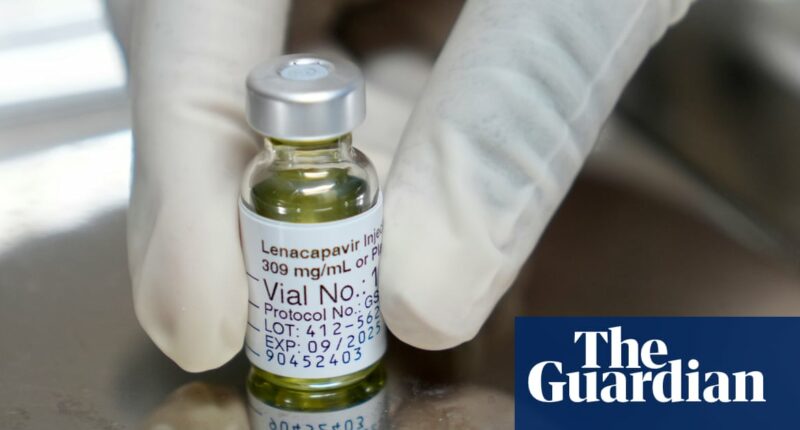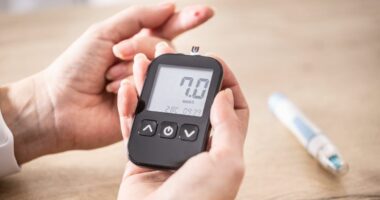Share this @internewscast.com
In an effort to combat HIV, affordable versions of an innovative biannual prevention injection will soon be accessible in low-income regions, with a pledge from funders to roll them out within the next two years.
Under recent agreements announced this week, Lenacapavir will be priced at $40 (£30) per patient annually for 120 low- and middle-income countries starting in 2027. This comes through partnerships with generic drug producers.
Globally, 2021 saw 1.3 million new HIV diagnoses, but experts argue that Lenacapavir, used for pre-exposure prophylaxis (PrEP), could drastically reduce these numbers. Clinical trials showed that biannual injections of the drug nearly entirely prevented new HIV cases.
The World Health Organization endorsed it for prevention in July, with its director general, Dr. Tedros Adhanom Ghebreyesus, calling it “the next best thing” to an HIV vaccine.
Concerns existed about the drug’s affordability where HIV prevalence is highest, especially since it debuted in the US with a price tag of $28,218 annually.
Gilead, the company behind the drug, has issued voluntary licenses to six generic manufacturers, including Dr. Reddy’s and Hetero Labs, enabling the product’s distribution through national HIV programs and entities like the Global Fund in 120 low- and middle-income nations.
Unitaid, the Clinton Health Access Initiative (Chai) and the Johannesburg-based Wits RHI have entered into partnership with Dr Reddy’s Laboratories, while the Gates Foundation has an agreement with Hetero Labs.
The $40 price tag will put the injectable drug in the same bracket as HIV-prevention pills, which many people at higher risk of infection struggle to take. The stigma surrounding HIV often means they want, or need, to hide the fact they are taking them.
Unitaid’s director, Dr Philippe Duneton, said: “Securing a $40 price for the twice-yearly lenacapavir injection for PrEP is a historic breakthrough that proves the most advanced tools can be made affordable from the very start.”
Timeline
Eight key dates in the fight against Aids and HIV
Show
1981
.
The first reports of a mysterious, deadly illness affecting gay men in the US appear in scientific journals.
1983
Scientists at the Pasteur Institute in Paris report the discovery of a virus that could be the cause of Aids – now known as HIV.
1987
The first antiretroviral (ARV) drug to fight HIV and Aids is approved by the US Food and Drug Administration. The 1990s will see huge advances in treatment that see deaths plummet for those who can afford the drugs.
2001
Generic pharmaceutical companies offer to produce cheaper forms of ARVs for developing countries. There are over 20 million people living with HIV in Africa but virtually no access to the drugs.
2003
The President’s Emergency Plan for Aids Relief (Pepfar) is announced by George W Bush to address HIV and Aids in hard-hit countries worldwide. It will eventually invest over $110bn (£84bn) and prevent millions of infections and deaths.
2007
The first cure: doctors announce that Timothy Ray Brown of San Francisco is free of HIV after undergoing a bone marrow transplant to treat leukaemia.
2015
The UN sets a Sustainable Development Goal (SDG) to end Aids as a public health threat by 2030.
Antiretroviral drugs to treat HIV were not available in sub-Saharan Africa for about a decade after they became an option for people living with HIV in high-income countries.
Bill Clinton, the former US president who co-founded Chai, said lenacapavir’s rollout represented “a genuine chance to end” the global epidemic of HIV.
Beatriz Grinsztejn, president of the International Aids Society, said: “We welcome lenacapavir generics being made affordable – a vital step to expand access – but availability in 2027 still feels far away.”
“With the HIV response in a funding crisis, countries are already making difficult trade-offs,” she said. “To realise the full potential of this innovation, PrEP options like lenacapavir must reach the most vulnerable people, which requires urgent, additional investment to avoid delays or denied access.”
There have been efforts to increase access in the period before generics become available, with Pepfar, the Global Fund and the Children’s Investment Fund Foundation promising funding to procure preventive lenacapavir for low- and middle-income countries (LMICs). Gilead has said it will provide them with the drug at no profit.
However, the Trump administration has suggested its funding should only apply to lenacapavir for pregnant and breastfeeding women, which would exclude other high-risk groups such as men who have sex with men, sex workers, people who use drugs and prisoners.
Furthermore, many countries with growing numbers of HIV cases are not on the list of 120 “high-incidence, resource-limited countries” that was agreed with Gilead.
Unitaid said it “remains committed to addressing access barriers in countries not covered by the existing agreements”.














